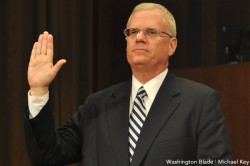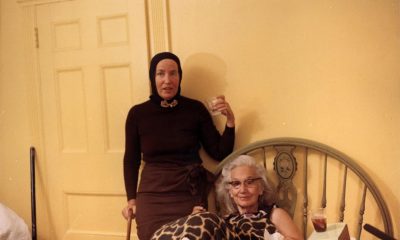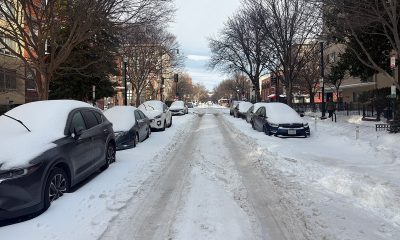National
Senate confirms gay nominee to Calif. federal court
Fitzgerald approved by vote of 91-6
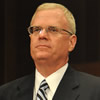
The Senate on Thursday confirmed to the bench a gay judicial nominee whom Republicans had held up for four months from receiving a floor vote along with other appointees.
Michael Fitzgerald, whom President Obama nominated for a seat on the U.S. District Court for the Central District of California in July, was approved by a vote of 91-6. A simple majority was required for confirmation.
The six senators who voted “no” were Roy Blunt (R-Mo.), Jim DeMint (R-S.C.), James Inhofe (R-Okla.), Mike Lee (R-Utah), Rand Paul (R-Ky.) and David Vitter (R-La.). Not voting were Sens. Lamar Alexander (R-Tenn.) and Orrin Hatch (R-Utah) as well as Mark Kirk (R-Ill.), who’s been recovering from a stroke.
“I am honored by the Senate’s confirmation vote today,” Fitzgerald said in a statement. “I am grateful to the President for my nomination. I am grateful to Senator Boxer for her recommendation of me to the President. I am grateful to Senator Feinstein for her support in the Senate Judiciary Committee. I look forward to serving the people of the Central District of California.”
The Senate Judiciary Committee reported out his nomination in November unanimously by voice vote to the Senate floor, but his confirmation has been held up along with other nominees.
Barbara Boxer (D-Calif.), who recommended the Fitzgerald nomination, spoke highly of him on the Senate floor prior to the vote as she chided Republicans for holding up his confirmation.
“He is an historic choice, and a vote of Mr. Fitzgerald’s nomination is long overdue, because he was voted out of the Senate Judiciary Committee unanimously 133 days ago, on Nov. 3, 2011,” Boxer said. “It really shouldn’t take this long to confirm such a highly-qualified nominee like Mr. Fitzgerald, especially because this seat has been designated a judicial emergency.”
According to Boxer’s office, former President George W. Bush’s district court nominees waited an average of 22 days as of March 2004 for confirmation after being reported out by the Judiciary Committee. Comparatively, President Obama’s district court nominees have waited an average of 93 days. Fitzgerald has waited 132 days for a vote on his nomination.
Fitzgerald was among 17 nominees pending before the Senate on which Senate Majority Leader Harry Reid (D-Nev.) filed cloture Monday as a result of Republicans objecting to floor votes on their confirmation. But as a result of a deal that was reached on Wednesday, Democrats and Republicans will move 12 district court judges and two circuit court judges through the confirmation process by May 7. Fitzgerald’s vote was locked in Thursday under the agreement.
LGBT advocates praised the confirmation of Fitzgerald and said his previous work over the years as an attorney makes him qualified for the position on the bench. Fitzgerald has had experience in private practice in addition to working as a U.S. attorney.
Chuck Wolfe, CEO of the Gay & Lesbian Victory Fund, said Fitzgerald’s legal experience “makes him an excellent choice for the federal bench.”
“He joins a still very small but growing group of openly LGBT federal judges, and we commend the Obama administration for making sure these esteemed positions are open to all qualified Americans, regardless of sexual orientation or gender identity,” Wolfe said.
Joe Solmonese, president of the Human Rights Campaign, said he applauds for the Senate for the confirming Fitzgerald — calling him “eminently qualified nominee” — as he took a jab at Republicans for holding up the nomination for so long.
“We are disappointed that it took months for the Senate to consider his nomination because Republican leadership has been refusing to give President Obama’s judicial nominees a timely up or down vote,” Solmonese said.
Michael Fleming, executive director of the David Bohnett Foundation and longtime friend of Fitzgerald’s, also had good things to say about the new judge upon his confirmation.
“I’ve known Michael for years and no one better embodies the qualities we seek to find in all of our judges — wisdom, honesty and integrity,” Fleming said. “There’s a reason why he was nominated by the president and why he has sailed through this process with such ease — because he has the skills and strengths to be a great judge.”
Lorri Jean, CEO of L.A. Gay & Lesbian Center, also said she’s known Fitzgerald for many years and believes he’ll serve the country with honor.
“I’m grateful to the President and the Senate for appointing a judge who brings to the bench not only a keen intellect, a wealth of legal experience and strong ethics, but life experience as a gay man,” Jean said. “It’s essential to have sexual orientation and gender identity diversity on the bench for the same reason it’s important to have racial and gender diversity in the judiciary; the life experience of judges provides valuable insight, and influences, their interpretation of the law. As Supreme Court Justice Sonia Sotomayor once said, ‘Personal experiences affect the facts that judges choose to see.’”
Congratulations also came from the White House.
“The president welcomes the confirmation of Michael Fitzgerald,” said White House spokesperson Shin Inouye. “He will serve the American people well on the U.S. District Court for the Central District of California.”
Fitzgerald was given a review by the American Bar Association, which gave him a rating of “unanimously well-qualified.”
Most recently, Fitzgerald worked at Corbin, Fitzgerald & Athey LLP in 1998, but prior to that experience, he worked at the Law Offices of Robert L. Corbin PC and at the law firm of Heller, Ehrman, White & McAuliffe.
The new judge also served as an assistant U.S. Attorney in Los Angeles, where he handled criminal cases, such as a drug and money laundering case involving what at that time was the second-largest cocaine seizure in California.
In his questionnaire response to the Senate Judiciary Committee, Fitzgerald wrote that he has participated in some LGNT activism, including the 2008 campaign against Proposition 8 as a door-knocker. Fitzgerald is also a member of the Harvard-Radcliffe Gay & Lesbian Caucus. From 2007 to 2008, he served on the leadership task force for the L.A. Gay & Lesbian Center. In the 1990s, he was a member of the Stonewall Democratic Club.
Fitzgerald isn’t a stranger to represent client in cases related to LGBT rights. He was involved in the settlement of Buttino v. FBI, the 1993 class-action lawsuit involving Frank Buttino, a gay FBI specialist who was anonymously outed to his superior, resulting in the removal of his security clearance and subsequent firing. Fitzgerald asked his law firm at the time to represent Buttino on a pro bono basis.
As a result of the settlement, the FBI renounced its prior policy of viewing homosexuality as a negative factor in regard to security clearances, the FBI agreed to hire an openly lesbian special agent and Buttino’s pension was restored.
Fitzgerald is the fourth out federal judicial nominee chosen by the White House, but third one to receive confirmation from the Senate. Fitzgerald’s confirmation makes him the first openly gay federal judge to serve in California.
In July, the Senate confirmed J. Paul Oetken to the U.S. District Court of Southern District of New York, making him the first openly gay male to sit on the federal judiciary. In October, the Senate confirmed lesbian Alison Nathan to the same court.
Another one of Obama’s gay judicial nominees, Edmund DuMont, was withdrawn after he asked the White House to remove him from consideration. DuMont was first nominated on April 14, 2010, but his nomination languished for more than 18 months without the taking Senate taking action. He was nominated the U S. Court of Appeals for the Federal Circuit and would have been the first openly gay federal appellate judge.
Puerto Rico
Bad Bunny shares Super Bowl stage with Ricky Martin, Lady Gaga
Puerto Rican activist celebrates half time show

Bad Bunny on Sunday shared the stage with Ricky Martin and Lady Gaga at the Super Bowl halftime show in Santa Clara, Calif.
Martin came out as gay in 2010. Gaga, who headlined the 2017 Super Bowl halftime show, is bisexual. Bad Bunny has championed LGBTQ rights in his native Puerto Rico and elsewhere.
“Not only was a sophisticated political statement, but it was a celebration of who we are as Puerto Ricans,” Pedro Julio Serrano, president of the LGBTQ+ Federation of Puerto Rico, told the Washington Blade on Monday. “That includes us as LGBTQ+ people by including a ground-breaking superstar and legend, Ricky Martin singing an anti-colonial anthem and showcasing Young Miko, an up-and-coming star at La Casita. And, of course, having queer icon Lady Gaga sing salsa was the cherry on the top.”
La Casita is a house that Bad Bunny included in his residency in San Juan, the Puerto Rican capital, last year. He recreated it during the halftime show.
“His performance brought us together as Puerto Ricans, as Latin Americans, as Americans (from the Americas) and as human beings,” said Serrano. “He embraced his own words by showcasing, through his performance, that the ‘only thing more powerful than hate is love.’”
National
Human Rights Watch sharply criticizes US in annual report
Trump-Vance administration ‘working to undermine … very idea of human rights’

Human Rights Watch Executive Director Philippe Bolopion on Wednesday sharply criticized the Trump-Vance administration over its foreign policy that includes opposition to LGBTQ rights.
“The U.S. used to actually be a government that was advancing the rights of LGBT people around the world and making sure that it was finding its way into resolutions, into U.N. documents,” he said in response to a question the Washington Blade asked during a press conference at Human Rights Watch’s D.C. offices. “Now we see the opposite movement.”
Human Rights Watch on Wednesday released its annual human rights report that is highly critical of the U.S., among other countries.
“Under relentless pressure from U.S. President Donald Trump, and persistently undermined by China and Russia, the rules-based international order is being crushed, threatening to take with it the architecture human rights defenders have come to rely on to advance norms and protect freedoms,” said Bolopion in its introductory paragraph. “To defy this trend, governments that still value human rights, alongside social movements, civil society, and international institutions, need to form a strategic alliance to push back.”
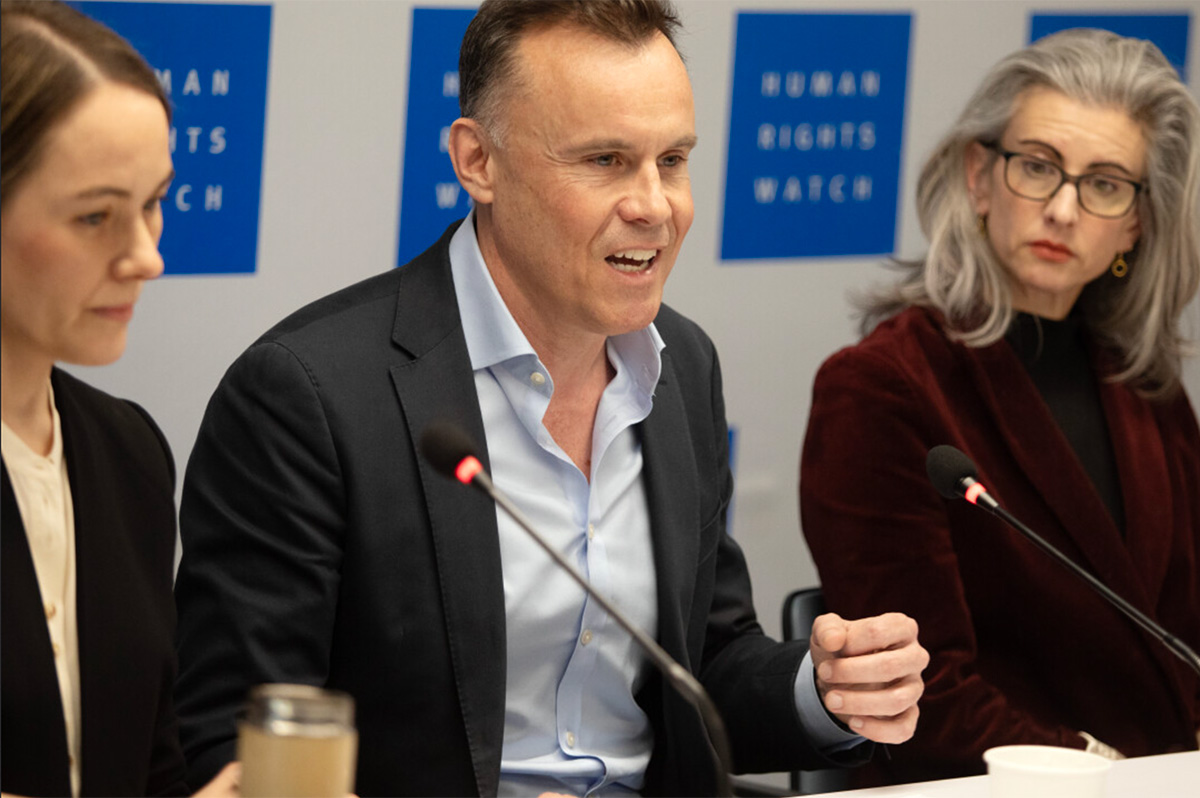
The report, among other things, specifically notes the U.S. Supreme Court’s Skrmetti decision that uphold a Tennessee law banning gender-affirming medical interventions for minors.
The Trump-Vance administration has withdrawn the U.S. from the U.N. LGBTI Core Group, a group of U.N. member states that have pledged to support LGBTQ and intersex rights, and the U.N. Human Rights Council. Bolopion in response to the Blade’s question during Wednesday’s press conference noted the U.S. has also voted against LGBTQ-inclusive U.N. resolutions.
Maria Sjödin, executive director of Outright International, a global LGBTQ and intersex advocacy group, in an op-ed the Blade published on Jan. 28 wrote the movement around the world since the Trump-Vance administration took office has lost more than $125 million in funding.
The U.S. Agency for International Development, which funded myriad LGBTQ and intersex organizations around the world, officially shut down on July 1, 2025. The Trump-Vance administration last month announced it will expand the global gag rule, which bans U.S. foreign aid for groups that support abortion and/or offer abortion-related services, to include organizations that promote “gender ideology.”
“LGBTQ rights are not just a casualty of the Trump foreign policy,” said Human Rights Watch Washington Director Sarah Yager during the press conference. “It is the intent of the Trump foreign policy.”
The report specifically notes Ugandan authorities since the enactment of the country’s Anti-Homosexuality Act in 2023, which punishes “‘carnal knowledge’ between people of the same gender” with up to life in prison, “have perpetrated widespread discrimination and violence against lesbian, gay, bisexual, and transgender (LGBT) people, their families, and their supporters.” It also highlights Russian authorities “continued to widely use the ‘gay propaganda’ ban” and prosecuted at least two people in 2025 for their alleged role in “‘involving’ people in the ‘international LGBT movement’” that the country’s Supreme Court has deemed an extremist organization.
The report indicates the Hungarian government “continued its attacks on and scapegoating of lesbian, gay, bisexual, and transgender (LGBT) people” in 2025, specifically noting its efforts to ban Budapest Pride that more than 100,000 people defied. The report also notes new provisions of Indonesia’s penal code that took effect on Jan. 2 “violate the rights of women, religious minorities, and lesbian, gay, bisexual, and transgender (LGBT) people, and undermine the rights to freedom of speech and association.”
“This includes the criminalization of all sex outside of marriage, effectively rendering adult consensual same-sex conduct a crime in Indonesia for the first time in the country’s history,” it states.
Bolopion at Wednesday’s press conference said women, people with disabilities, religious minorities, and other marginalized groups lose rights “when democracy is retreating.”
“It’s actually a really good example of how the global retreat from the U.S. as an actor that used to be very imperfectly — you know, with a lot of double standards — but used to be part of this global effort to advance rights and norms for everyone,” he said. “Now, not only has it retreated, which many people expected, but in fact, is now working against it, is working to undermine the system, is working to undermine, at times, the very idea of human rights.”
“That’s definitely something we are acutely aware of, and that we are pushing back,” he added.
Maryland
4th Circuit dismisses lawsuit against Montgomery County schools’ pronoun policy
Substitute teacher Kimberly Polk challenged regulation in 2024

A federal appeals court has ruled Montgomery County Public Schools did not violate a substitute teacher’s constitutional rights when it required her to use students’ preferred pronouns in the classroom.
The 4th U.S. Circuit Court of Appeals in a 2-1 decision it released on Jan. 28 ruled against Kimberly Polk.
The policy states that “all students have the right to be referred to by their identified name and/or pronoun.”
“School staff members should address students by the name and pronoun corresponding to the gender identity that is consistently asserted at school,” it reads. “Students are not required to change their permanent student records as described in the next section (e.g., obtain a court-ordered name and/or new birth certificate) as a prerequisite to being addressed by the name and pronoun that corresponds to their identified name. To the extent possible, and consistent with these guidelines, school personnel will make efforts to maintain the confidentiality of the student’s transgender status.”
The Washington Post reported Polk, who became a substitute teacher in Montgomery County in 2021, in November 2022 requested a “religious accommodation, claiming that the policy went against her ‘sincerely held religious beliefs,’ which are ‘based on her understanding of her Christian religion and the Holy Bible.’”
U.S. District Judge Deborah Boardman in January 2025 dismissed Polk’s lawsuit that she filed in federal court in Beltsville. Polk appealed the decision to the 4th Circuit.
-

 a&e features5 days ago
a&e features5 days agoMarc Shaiman reflects on musical success stories
-

 Television4 days ago
Television4 days agoNetflix’s ‘The Boyfriend’ is more than a dating show
-

 Movies4 days ago
Movies4 days ago50 years later, it’s still worth a return trip to ‘Grey Gardens’
-

 Opinions4 days ago
Opinions4 days agoSnow, ice, and politics: what is (and isn’t) happening

